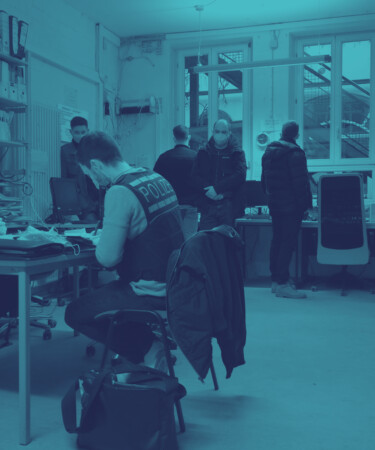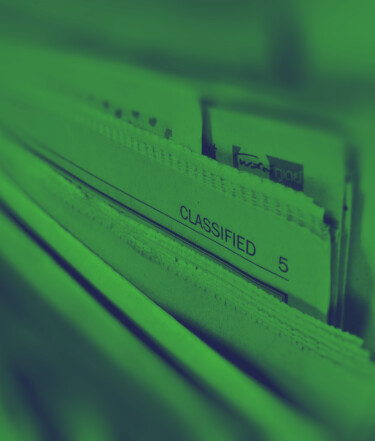
Radio Dreyeckland: Search of editorial offices violates freedom of the press
In early 2023, the editorial offices of Radio Dreyeckland and the homes of two journalists were searched. The reason was the setting of a link to the banned platform linksunten.indymedia in an article. Together with the affected journalists, we successfully filed an appeal against the search and seizure orders. In addition, GFF is supporting the journalist charged before the Karlsruhe Regional Court in the main proceedings. After one success and one defeat, we are now taking our case to the Federal Constitutional Court.
In May 2023, the Karlsruhe Regional Court decided that it is lawful to link to websites with possibly illegal content for the purpose of comprehensive reporting. This clarification was particularly urgent for the non-commercial station Radio Dreyeckland based in Freiburg. The Karlsruhe District Court had ordered a search of the editorial offices and the homes of two editors after Radio Dreyeckland had published an article linking to the archive of the portal linksunten.indymedia, which was banned in 2017. During the searches, the police confiscated, among other things, several laptops on which a large part of the radio's editorial communication was located. The reason for the searches was a suspicion of supporting a banned association (section 85 (1), (2) var. 3 StGB). Searching editorial offices and confiscating mobile devices because of reporting is disproportionate and clearly violates the freedom of the press and broadcasting.
Therefore, together with the independent broadcaster Radio Dreyeckland, we filed a complaint against the actions of the Karlsruhe District Court and the Public Prosecutor's Office. The Karlsruhe Regional Court considered the searches and seizure of laptops to violate several fundamental rights, such as freedom of broadcasting, and declared the action unlawful.
REPORTING IS PROTECTED BY FUNDAMENTAL RIGHTS
The penal norms on support for banned organisations (section 85 (2) var. 3 StGB) are vague and far-reaching. Therefore, in order to protect fundamental rights such as freedom of the press, such norms must be interpreted in such a way that they do not jeopardise free reporting. The press not only has a right but even a duty to report on media bans and investigative proceedings such as the one against linksunten.indymedia.
This reporting also includes linking to websites with possibly illegal content or, as in this case, an online archive. Setting a link alone cannot be considered a criminal act of support and in no way justifies a search of the editorial offices. Only if readers are allowed to be fully informed can an independent formation of opinion be ensured.
In the decision, the Karlsruhe Regional Court clarifies that setting a link can be part of the protected area of free reporting and that such links can be part of the performance of journalistic duties and that media can only be prosecuted for the linked content under certain circumstances. The mere linking to an archive page is protected by freedom of the press and cannot be regarded as support for a banned association. Radio Dreyeckland and the accused journalists were represented by defence lawyers Angela Furmaniak, Dr Lukas Theune and Sven Adam.
BAN ON LINKUNTEN.INDYMEDIA DISPROPORTIONATE
In August 2017, the Federal Ministry of the Interior banned the internet platform linksunten.indymedia on the basis of the Law on Associations (§ 3 VereinsG). The Federal Administrative Court (BVerwG) dismissed the complaints against the ban on formal grounds.
As part of the proceedings before the BVerwG, the GFF had submitted a supporting statement, a so-called amicus curiae brief. The subsequent constitutional complaint, which was directed against both the ban on the platform under association law and the court decisions confirming the ban, was also dismissed on formal grounds in March 2023. The Federal Constitutional Court did not answer the central question of whether the ban on linksunten.indymedia violated the freedom of the press.



